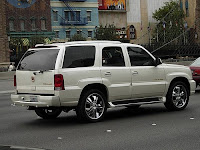Stupid Gas-Guzzling SUV?
| August 5, 2008 | Posted by Roshawn Watson under Uncategorized |
Comments off
|
Image Credit: Reto Kurrmann
SUVs are Not in Demand
Not exactly. According to a recent New York Times article, you should first think about the fact that not that many people want your SUV right now. According to Autodata, sales for SUVs are down by over 43%. Additionally, the rate of depreciation for SUVs has been declining like a rock over the past 6 to 8 months (please excuse the pun). Apparently, these SUVs have depreciated twice as fast as normal. Thus, trading in your SUV may not bring you as much money as you think. For example, prices of used SUVs are down by 12% compared to last year according to J.D. Power and Associates.
Did You Save Anything?
Additionally, even if you did unload the SUV, purchasing that new hybrid will not necessarily save you money. Although there are many great articles saying that you will save in the long- term, you have to evaluate your own situation. Think about what you are currently spending on gas with your SUV, and then think about what you would spend with the new car. This question is becoming so popular, that Edmunds.com has created a handy Gas Guzzler to Gas Sipper trade-in calculator. The answer may surprise you. For example, in some cases it may take you over a decade for the purchase to make financial sense.
What Are Your Needs
Another issue is why did you purchase the SUV in the first place: is there a compelling reason for you to keep it? For example, suppose you need to carry a lot of supplies in your car or you happen to be a larger than normal-sized person. A smaller hybrid may not meet your needs in these instances. Consider the following example.
Say you need to haul three rows of people but still want to save on gas costs. So you trade in your 2005 Ford Expedition for a 2008 Toyota Highlander hybrid with a third row. It will take more than 15 years to break even on that deal, driving 1,500 miles a month, according to the Edmunds.com calculator.
Demand for 4-cylinder cars is at a high, with them comprising of ~10% more of new car sales than they did a year ago. Additionally, the supply for popular makes and model is limited. Thus, it is thought that prices for these vehicles are higher now than what they would have been a few months ago.
Are You Having a Gut Reaction
It is perfectly normal to want to respond to rising fuel costs by mitigating losses. However, you have to ask yourself whether the change is truly worth it for you financially or merely a knee-jerk reaction. For example, just because fuel has increased doesn’t mean your mechanic is charging your more for repairs nor does it mean that your insurance rates have increased proportionately. In most cases, these maintenance costs are constant. In other words, there are numerous costs associated with owning a car, and an increase in one of them (fuel) doesn’t necessarily make it financially prudent to sell a rapidly depreciating asset for an overpriced depreciating asset.
Lastly, if you like this post, please click here to get my Brand New eBook FREE and Propel it, Stumble it, and tag it on Delicious.
Copyright 2008, Roshawn Watson, Pharm.D. All Rights Reserved.
Copyright 2012, Roshawn Watson, Pharm.D., Ph.D. All Rights Reserved.








Recent Comments